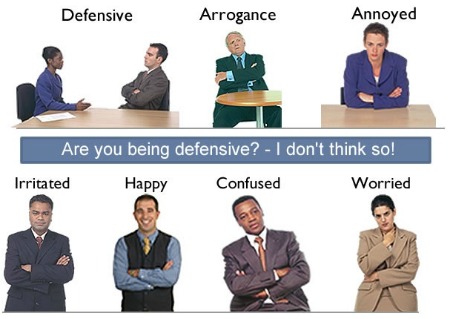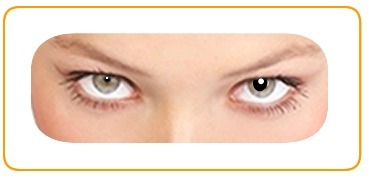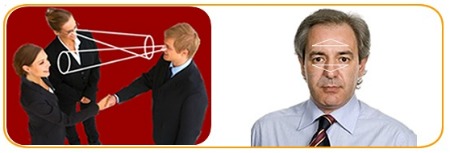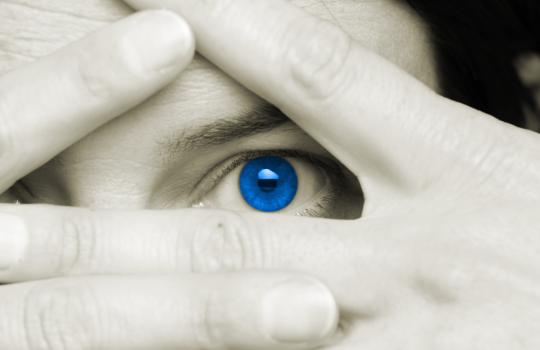Our resident body language expert Peter Clayton continues his look at questions from the community. Here he takes a look at common questions about the eyes and arms.

Question: "I believe in body language, but I have been told on a number of occasions if I fold my arms I’m being defensive, when I know I’m not."
If your arms are folded it could be that you are being defensive. However, it could also suggest that you are irritated, worried, confused, annoyed, satisfied, bored or happy. Much has been written about body language which suggests, misleadingly, that one signal has one explanation. The fact is that you also have to take into account facial expressions, body movement and voice to support what you are seeing, otherwise the folded arms gesture will be wrongly interpreted.
Let’s suppose you were talking to someone and after a while they casually folded their arms, moved a few inches further away and at the same time reduced eye contact from say 90% down to 70%. When it was their turn to speak they spoke more quietly than before. You may be right in thinking there was something wrong.
These movements would be slow and polite and the person you are talking to may still appear to be interested in what is being said. Even when someone loses interest or becomes disengaged, they don’t always want you to know because it would be bad manners.
The best way to study this is to watch people talking to each other. It’s amazing how often you will see exactly what’s happening and yet the person on the receiving end of the gestures sees less than you do and usually moves to close the gap.
I recently watched two people talking at a conference and over a period of 10 minutes they had moved almost six feet. One of them was animated whilst the other had moved backwards, folded their arms, dropped their shoulders and lowered their eyes. When, after 10 minutes, someone else joined them, the one fellow disappeared quickly whilst the other one waved and said they should catch up later. I really do love studying body language, it’s more interesting than watching the TV or reading a good book.
Okay, back to the point, when several pieces of body language happen together or over a short period of time, (arms folded, movement away, eyes drop, head shows less movement and the voice is lower with shorter comments) they form a “body language cluster”. It indicates that there is something to be curious about. And to find out what, ask the right questions.

Question: "I have heard you mention ‘beady and Bambi eyes’ before, what does it mean?"
Beady eyes is a term that has been used to describe the eyes of a person who, generally speaking, we do not trust. "I could see it in his eyes." Their pupils become constricted or tiny. Constricted pupils are often used in movies to make sure that we dislike the bad guy. (It’s done with eye-drops.) Pupils constrict when someone is being deceitful, lying, angry or displaying negative emotions.
Bambi eyes – when someone is enthusiastic about something or someone their pupils will dilate. They are reminiscent of characters in Disney films which have big eyes. I started to use the term about 20 years ago and it seems to have stuck with me.
It’s useful to see when someone’s eyes are "Bambi-like" especially during a sales visit and even better when negotiating. It is quite useful in interviewing as well.
When teams from each side are involved in negotiations on behalf of their company, it is very helpful to have some if not all of the light in your favour. I often attend negotiations just to read body language, the eyes especially. It is invaluable during negotiation to know who is more pleased than they are letting on.

Question: "I have always been told to look someone in the eyes when talking to them, but sometimes I feel uncomfortable and I am not sure whether this is right."
Quite often when we are young, parents or guardians will say, "Look me in the eye and tell me the truth." As we grow up we believe that this is a normal everyday part of communication to convey honesty, but in point of fact it can be intimidating for others and sometimes it is difficult to keep concentration whilst staring into someone’s eyes.
It is better to look at the whole face, as if you were staring at something about 12 inches in front of the face, so it is looking or gazing rather than staring. In this way you are not looking directly into the eyes and maintaining concentration will be easier. As for the person you are looking at, most people would feel more comfortable with this type of gaze.
Question: "When someone is being difficult is it possible to use my own body language to help calm things down?"
There are a few things that might help to prevent someone from being so difficult, either to you or others.
The easiest and quickest is to stare fixedly at them in the forehead – this disconcerts most people. I do this when someone is trying to be unnecessarily assertive or giving me a hard time when negotiating.
At the same time, lower the volume of your voice slightly and flatten the tone ( this is difficult to describe, sorry). It invariably makes the recipient feel uncomfortable after a few minutes because they know that something is wrong, but they are not sure what it is.
It works every time for me and can be quite rewarding as well a bit of fun on occasions when you are with someone who is trying to be unnecessarily assertive. And if you are standing, try moving a little bit too close and invade their personal space as this can be quite disconcerting.
Please let me have your body language FAQs – I will do my best to answer them. Email them to editor@trainingzone.co.uk.
Our resident body language expert Peter Clayton continues his look at questions from the community. Here he takes a look at common questions about the eyes and arms.

Question: "I believe in body language, but I have been told on a number of occasions if I fold my arms I’m being defensive, when I know I’m not."
If your arms are folded it could be that you are being defensive. However, it could also suggest that you are irritated, worried, confused, annoyed, satisfied, bored or happy. Much has been written about body language which suggests, misleadingly, that one signal has one explanation. The fact is that you also have to take into account facial expressions, body movement and voice to support what you are seeing, otherwise the folded arms gesture will be wrongly interpreted.
Let’s suppose you were talking to someone and after a while they casually folded their arms, moved a few inches further away and at the same time reduced eye contact from say 90% down to 70%. When it was their turn to speak they spoke more quietly than before. You may be right in thinking there was something wrong.
These movements would be slow and polite and the person you are talking to may still appear to be interested in what is being said. Even when someone loses interest or becomes disengaged, they don’t always want you to know because it would be bad manners.
The best way to study this is to watch people talking to each other. It's amazing how often you will see exactly what's happening and yet the person on the receiving end of the gestures sees less than you do and usually moves to close the gap.
I recently watched two people talking at a conference and over a period of 10 minutes they had moved almost six feet. One of them was animated whilst the other had moved backwards, folded their arms, dropped their shoulders and lowered their eyes. When, after 10 minutes, someone else joined them, the one fellow disappeared quickly whilst the other one waved and said they should catch up later. I really do love studying body language, it's more interesting than watching the TV or reading a good book.
Okay, back to the point, when several pieces of body language happen together or over a short period of time, (arms folded, movement away, eyes drop, head shows less movement and the voice is lower with shorter comments) they form a “body language cluster”. It indicates that there is something to be curious about. And to find out what, ask the right questions.

Question: "I have heard you mention 'beady and Bambi eyes' before, what does it mean?"
Beady eyes is a term that has been used to describe the eyes of a person who, generally speaking, we do not trust. "I could see it in his eyes." Their pupils become constricted or tiny. Constricted pupils are often used in movies to make sure that we dislike the bad guy. (It’s done with eye-drops.) Pupils constrict when someone is being deceitful, lying, angry or displaying negative emotions.
Bambi eyes - when someone is enthusiastic about something or someone their pupils will dilate. They are reminiscent of characters in Disney films which have big eyes. I started to use the term about 20 years ago and it seems to have stuck with me.
It's useful to see when someone's eyes are "Bambi-like" especially during a sales visit and even better when negotiating. It is quite useful in interviewing as well.
When teams from each side are involved in negotiations on behalf of their company, it is very helpful to have some if not all of the light in your favour. I often attend negotiations just to read body language, the eyes especially. It is invaluable during negotiation to know who is more pleased than they are letting on.

Question: "I have always been told to look someone in the eyes when talking to them, but sometimes I feel uncomfortable and I am not sure whether this is right."
Quite often when we are young, parents or guardians will say, "Look me in the eye and tell me the truth." As we grow up we believe that this is a normal everyday part of communication to convey honesty, but in point of fact it can be intimidating for others and sometimes it is difficult to keep concentration whilst staring into someone’s eyes.
It is better to look at the whole face, as if you were staring at something about 12 inches in front of the face, so it is looking or gazing rather than staring. In this way you are not looking directly into the eyes and maintaining concentration will be easier. As for the person you are looking at, most people would feel more comfortable with this type of gaze.
Question: "When someone is being difficult is it possible to use my own body language to help calm things down?"
There are a few things that might help to prevent someone from being so difficult, either to you or others.
The easiest and quickest is to stare fixedly at them in the forehead – this disconcerts most people. I do this when someone is trying to be unnecessarily assertive or giving me a hard time when negotiating.
At the same time, lower the volume of your voice slightly and flatten the tone ( this is difficult to describe, sorry). It invariably makes the recipient feel uncomfortable after a few minutes because they know that something is wrong, but they are not sure what it is.
It works every time for me and can be quite rewarding as well a bit of fun on occasions when you are with someone who is trying to be unnecessarily assertive. And if you are standing, try moving a little bit too close and invade their personal space as this can be quite disconcerting.
Please let me have your body language FAQs – I will do my best to answer them. Email them to editor@trainingzone.co.uk.




